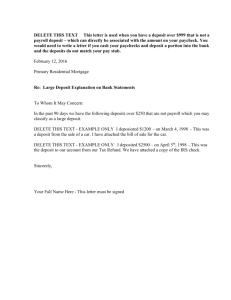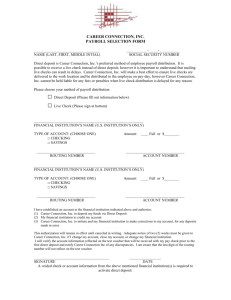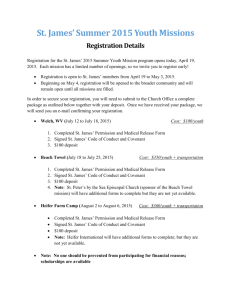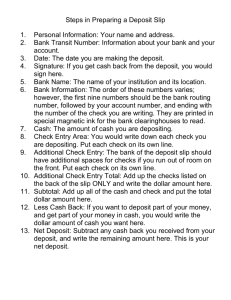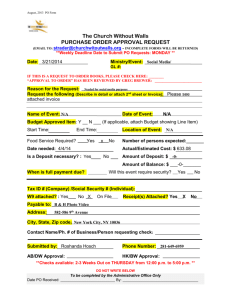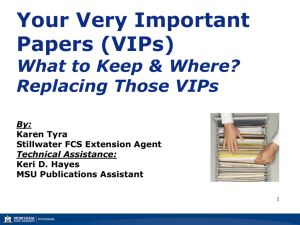Household Records Reference Guide
advertisement
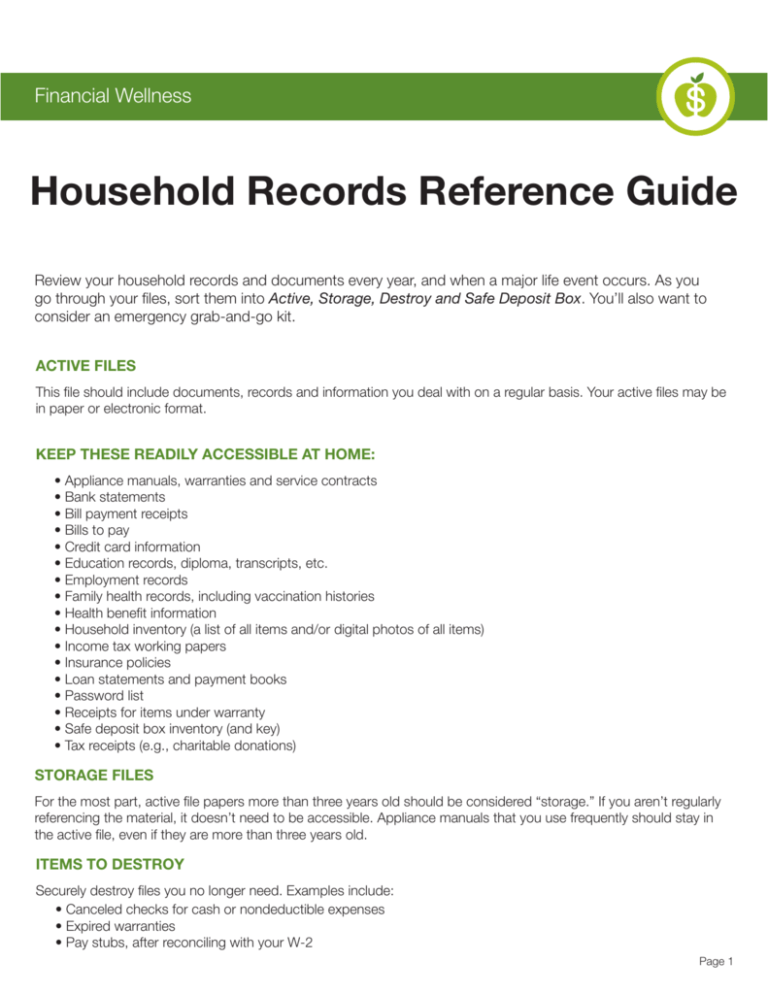
Financial Wellness Household Records Reference Guide Review your household records and documents every year, and when a major life event occurs. As you go through your files, sort them into Active, Storage, Destroy and Safe Deposit Box. You’ll also want to consider an emergency grab-and-go kit. ACTIVE FILES This file should include documents, records and information you deal with on a regular basis. Your active files may be in paper or electronic format. KEEP THESE READILY ACCESSIBLE AT HOME: • Appliance manuals, warranties and service contracts • Bank statements • Bill payment receipts • Bills to pay • Credit card information • Education records, diploma, transcripts, etc. • Employment records • Family health records, including vaccination histories • Health benefit information • Household inventory (a list of all items and/or digital photos of all items) • Income tax working papers • Insurance policies • Loan statements and payment books • Password list • Receipts for items under warranty • Safe deposit box inventory (and key) • Tax receipts (e.g., charitable donations) STORAGE FILES For the most part, active file papers more than three years old should be considered “storage.” If you aren’t regularly referencing the material, it doesn’t need to be accessible. Appliance manuals that you use frequently should stay in the active file, even if they are more than three years old. ITEMS TO DESTROY Securely destroy files you no longer need. Examples include: • Canceled checks for cash or nondeductible expenses • Expired warranties • Pay stubs, after reconciling with your W-2 Page 1 SAFE DEPOSIT BOX Use a safe deposit box for originals of important documents. A good rule of thumb: Put documents in the box if you can’t easily replace them or if you don’t know what might happen if you don’t have them. Take note: You’ll still need copies of certain documents at home if something should happen to you and your safe deposit box gets sealed. If you’d rather keep your records at home, get a fireproof/waterproof safe. Regardless of whether you use a safe deposit box or an at-home safe, be sure to store documents in airtight waterproof containers (like plastic zipper bags), just in case. The following types of documents should be kept in a safe deposit box or locked in a fireproof/waterproof safe in your home: • Adoption papers • Advance directives* • Birth and death certificates • Citizenship papers • Contracts of importance • Deeds and property titles • Copy of household inventory • Life insurance policies • Marriage licenses and divorce decrees • Military discharge papers • Passports • Powers of attorney* • Social Security cards • Stock and bond certificates • Wills* * Since the safe deposit box will be sealed at your death, keep a copy of your will for future reference. Consult your attorney before you put an original copy of your will in a safe deposit box, as state laws vary. The same goes for the advance directive and powers of attorney since you won’t be able to give others access to the safe deposit box if you’re incapacitated. If applicable, you should have official or certified copies of documents for your safe deposit box or at-home safe. “Official” means an original copy with all required signatures. Some documents, such as birth certificates, must also be certified or notarized to be considered valid. If you need to obtain documents regarding birth, death, marriage, or divorce, check out “Where to Write for Vital Records.” (www.cdc.gov/nchs/w2w.htm) Be wary of companies that offer to sell you copies of official papers; you should check with the appropriate government agency to see if it will provide the same information free or at a lower price. If you are unsure whether you need a certified copy, or want more information about which local government office can give you originals of these documents, contact your local consumer protection office. (www.usa.gov/directory/ stateconsumer/index.shtml) Beware of companies that pressure you into buying a certified copy of your title or deed. You do not have to use a private company to obtain a certified copy of the deed to your home. In many states you can obtain one from your local register of deeds for free or at a low cost. Some companies may even cite government agencies as the reason you should buy the deed from them. Don’t believe it. The government does not endorse any company selling these products. Page 2 GRAB-AND-GO KIT FOR EMERGENCIES Disasters like floods, fires, earthquakes and tornadoes strike without warning and can affect anyone. Your top priority in these situations is making sure your family is safe. An easy-to-grab emergency financial records kit will you have access to important documents in case something unexpected happens. Store the documents in a plastic accordion file and keep it in your emergency supply kit so everything you need is together. Items you should put in the kit include copies of: • Birth and marriage certificates • Divorce decrees • Social Security cards of household members • Driver’s license and other wallet cards • Will and/or trust documents, including powers of attorney • Recent income tax return • Passports and/or other identity documents • Military discharge papers • A list of your prescriptions: name of medication, dosage, and pharmacy • Insurance policy information • Bank, credit union and credit card account list • Summary of personal, financial, property, and other vital information Remember that these documents contain personal information like Social Security numbers and bank account information that could be used against you if it fell into the wrong hands. Store your financial records kit in a secure location where you can easiily carry it away during a disaster — not for a thief to carry away in a robbery. Page 3 Adapted from USA.gov www.usa.gov/topics/money/personal-finance/managing-household-records.shtml Rev. 5/15


